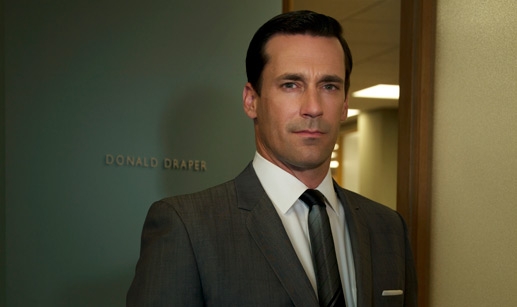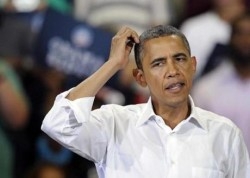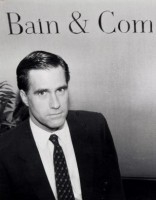
“Changing the Conversation”: Campaign Distractions on the Road to the White House
In an episode of Mad Men, the popular series set in the early 1960s, Madison Avenue advertising executive Don Draper offers this advice to a colleague: “If you don’t like what is being said, change the conversation.” This dictum is not limited to the realm of advertising.
Last week’s coverage of the American presidential campaign, shows that both Democrat and Republican political operatives are attempting to use the tactic to reframe the November election in a way which favors their candidate and diminishes his opponent. But one party appears to be doing a better job than the other in “changing the conversation.”
As election day approaches in a presidential contest which will likely be the most significant since the pivotal 1860 election (in terms of establishing the general trajectory of the country and what it means to be American). Both incumbent President Barack Obama and his Republican challenger Mitt Romney no longer appear to be running issues-based campaigns.

Here are the issues: America is saddled with an almost unrepayable deficit, an array of unsustainably expensive social welfare programs which are decades overdue for reform, an overly complicated 71,000 page tax code, a near-stagnant economy with a weakening job market and a looming budget crisis which, if unaddressed, will raise interest rates to crippling levels and trigger massive automatic spending cuts that will damage the nation’s credibility and the global economy. Instead of hearing both Romney and Obama discussing how to right these wrongs and how to restore the country’s competitive edge in the increasingly interconnected global economy, they have “changed the conversation.”
Obama has done so out of necessity. As the incumbent president, he wears the steady stream of bad economic news and likely knows that offering credible plans to address these crucial issues requires him to first acknowledge their existence. He therefore risks being portrayed by the media as a president who, throughout a four-year term of office, did not deal with these issues as America moved ever-faster towards the fiscal and socio-political cliff. If the election were to be a referendum on his performance on these issues and also on the ideological trajectory he implemented in those four years, he would undoubtedly lose the November 6th election. However, if he were to “change the conversation” of the campaign to divert attention away from both these issues and also from his past performance, he would have a better chance of winning a second term. The issue which has allowed him to do so has been Mitt Romney’s business record.
Romney has spent most of the week staying off-message and defending his private sector business record against virulent allegations by the Obama campaign that Romney’s tenure as the chief executive officer (CEO) of the private equity and venture capital firm Bain Capital in the 1990s resulted in countless hostile takeovers, the shuttering of many American businesses and the exporting of thousands of American jobs overseas. Furthermore, the Obama campaign accuses Romney of committing a felony, claiming that, for three years following his 1999 departure from Bain to serve as the CEO of the 2002 Salt Lake City Olympics, Romney still controlled Bain. Since Romney’s name appears on a variety of Securities and Exchange Commission (SEC) documents between 1999 and 2002, the Obama campaign claims that Romney was illegally operating Bain Capital after he had formally resigned. The Obama campaign ignores the fact that it is not unusual for the names of former executives to remain on SEC disclosure forms for a number of years as a company formally vets and brings the replacement CEO up-to-speed on the inner workings and complexities of the position he or she inherits. This process may have taken longer than usual at Bain Capital since Romney’s departure in 1999 occurred without much warning and other executives at Bain had little time to prepare the transition given Romney’s absence.

Furthermore, Romney has also been off-message for quite some time due to the controversy raised by his refusal to release a more extensive selection of his annual income tax returns. There may be a number of reasons why he has refused to release income tax returns that predate the legally required two years preceding the election date. One reason may be that they will reveal that he consistently made a substantial amount of money, thereby reinforcing Obama’s definition of Romney and the Republicans as the candidate and party of extreme wealth, out of touch with the majority of Americans. All accusations of class warfare aside, it is undeniably true that Romney’s estimated personal wealth of about $250 million marks him as a rich man, but it is important to remember that he is not the only wealthy man ever to have run for election in America.
President John F. Kennedy’s father, Joseph P. Kennedy Sr., served as the Chairman of the SEC despite the fact that he made a large portion of his fortune through insider trading and market manipulation tactics like “bear raiding” and “pumping and dumping” albeit before these tactics were technically illegal. He would eventually rise to the position of United States Ambassador to the United Kingdom in the final years before the Second World War. Between the 1920s and his death in 1969, Joseph Kennedy made roughly $500 million which he contributed to the family war chest. Adjusted for inflation, in today’s dollars, that $500 million would represent well over $3 billion. When his son John F. Kennedy won the presidency in 1960, there were no accusations that the Democrat was out of touch with the majority of Americans due to his family’s extreme personal wealth. It is worth noting that, even as early as 1935 during the height of the Great Depression, the Kennedys had a net worth of at least $180 million dollars, or $3 billion in today’s money, a sum which is approximately 11 times the net worth of Mitt Romney.
Another reason Romney may be hesitating to release a more extensive array of tax returns could be that they would show that much of his annual income was accumulated through investments which carry far lower tax rates than does income tax in the USA. This could increase the criticism that he, and many wealthy individuals like him, pay tax rates which are disproportionately too low. That characterization would further hamper his ability to break free of the Obama campaign’s framing of him as being out of touch with ordinary Americans. Instead of skirting around these issues, Romney should take a page from Don Draper’s book and “change the conversation.”
To get his campaign back on track and back on message, Romney should release more annual tax returns and confront the Bain Capital accusations head on. He should address the lower tax rates he benefited from under the US Tax Code and also remind the American public about the large charitable donations he makes as a form of socially responsible compensation for his lower tax rates. For example, in 2010 alone, Romney gave 14% of his income to charity while two years before winning the presidency Obama donated 6.1% of his income. Obama’s future running mate, now Vice-President, Joe Biden only gave a paltry 0.15% of his 2006 income to charity. Romney should then change the conversation of his campaign to a discussion of how the Obama presidency has not lived up to confronting the challenges which could cripple the United States of America in the twenty-first century. He must then redefine himself as the man who offers a business-based approach in dealing with these challenges, in stark contrast to the community-organizing sitting president. The point should be made that rhetoric can no longer suffice and that appropriate, measured and tangible policies (which he, Romney, can offer) are what is needed for America to survive in the brave new globalized world.















